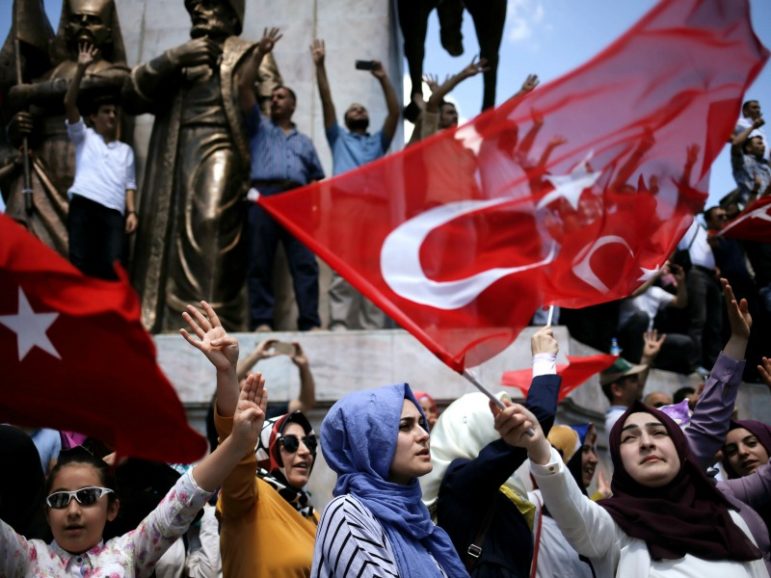(RNS) One of the most important developments in global politics and religion is the triumph of “thick” over “thin.” By that I mean the triumph of politicians and religious leaders who offer strong rather than weak national identity platforms, passionate rather than becalmed articulations of loyalty, particularist rather than universalist policy visions.
I borrow the “thick” and “thin” language from my teacher Glen Stassen, who got it, I think, from Jewish political philosopher Michael Walzer. Both used it to describe culturally rooted, robust, detailed, substantive, particularist intellectual and moral traditions as opposed to detached, broader, weaker, abstract, universalist alternatives. (Neither Walzer nor Stassen are to be blamed for how I use the terminology here.)
In many contexts, thick is better than thin. Thick identity. Thick loyalty. Thick traditions. Thick connections. The point applies in realms beyond religion and politics. Take family. Or even business.
And thick is besting thin all over the world. In Russia, there’s Vladimir Putin’s Russian nationalism combined with Russian Orthodox traditionalism. In Turkey, there’s Recep Tayyip Erdogan’s Muslim-inflected, post-secular Turkish nationalism. In Britain, it’s the United Kingdom Independence Party and Brexit, representing British (or at least English) nationalism over globalism and Europeanism. In Israel, it’s Israeli nationalism over liberal internationalism. And in America, it’s Donald Trump’s America First populist nationalism over Hillary Clinton’s cosmopolitan internationalism.
In religion, it’s the resurgence of fundamentalisms, orthodoxies, and traditionalisms of all types — Hindu, Muslim, Jewish, Catholic, and Protestant-evangelical come to mind, but I am sure there are others. It’s the triumph of strong and exclusive religious identities over weaker and more inclusive ones, traditional doctrinal formulations over modernist revisions, and demanding religious practice norms over looser or more nominal expectations.
It’s especially powerful when these thick religious and political loyalties flow together into a composite religious nationalism. Add a dollop of “race” and you’ve got a tiger by the tail.
One of the most striking things Donald Trump regularly said during the election campaign was that without border enforcement, “you don’t have a country.”
Perhaps what he meant to apply to one policy issue has broader application, wider resonance. People want to “have a country” that still means something, so they choose country over Europe, country over global trade deals, country over international norms, country over inclusivity ethics. It’s a thick, local, particularist identity and loyalty.
And in religion, “you don’t have a religion” without doctrinal borders, without behavioral expectations, without clear identity demarcations over against those of other religions and no religion.
The dangers of this kind of thinking are manifest with every “thick” nationalism and religious orthodoxy. We know them well — intolerance, extremism, repression. Those problems or potential problems tend to produce anti-nationalist, anti-tribalist, and anti-orthodox reactions and the move toward various thinner and more abstract universalisms. But then these tend to produce their own reactions with a swing back to stronger and more passionate thick loyalties.
My own 40-year experience as a (Southern) Baptist, and now a pastor, amply confirms this observation. Baptist fundamentalism produced a “moderate” and liberal Baptist reaction; moderate and liberal versions of Baptist life produced a resurgent fundamentalism; this resurgent fundamentalism produced an even deeper anti-fundamentalist allergy among its opponents.
Far too often we have ended up with a thick Baptist fundamentalism sure of everything and a thin Baptist anti-fundamentalism sure of nothing — other than the evils of fundamentalism, which is not an agenda that can sustain a religious community for very long.
I am confident this description describes more than the Baptist predicament.
These days as I prepare to preach weekly sermons in a post-Southern Baptist church outside Atlanta, I am trying to offer a non-fundamentalist but still thick account of Christian theology and practice. Here, I am seeking to say, we teach a religion with substance, a religion worth devoting your life to, a religion with biblical rooting, doctrinal solidity, and ethical-communal expectations. So far, so good.
The same thing will need to happen at the national political level. If we don’t like Donald Trump’s version of thick American nationalism and national loyalty, we must offer an equally thick but more compelling alternative. We must articulate and demonstrate why our understanding of what it means to be American, of the core values of American democracy, and of best public policies, are superior to the alternative on display — within the terms of a thick American identity and loyalty.
Because thick beats thin every time.
(David Gushee is distinguished university professor of Christian Ethics and Director of the Center for Theology and Public Life at Mercer University in Georgia. He writes the Christians, Conflict and Change column for RNS)





